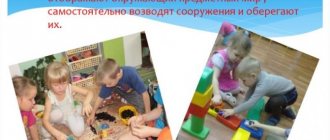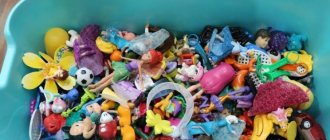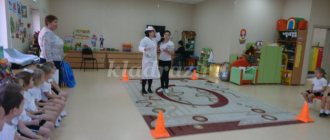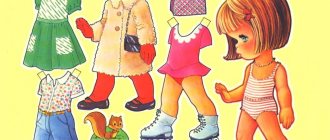Game as a means of economic education of children of senior preschool age
This article highlights theoretical and practical issues of using games as a means of economic education in a modern preschool educational organization.
In modern conditions, there has been a significant increase in public interest in the process of economic education of the younger generation. New economic conditions contribute to the formation of modern children as full participants in socio-economic processes, which leads to the need to organize the economic education of children already in preschool age. In the process of economic education of preschool children in preschool educational organizations, the economic literacy of children is increased, a modern style of thinking is developed, which meets the requirements of the time, and represents the basis for further educational work.
In the studies of A.D. Shatova, an accelerated pace of socialization of children is noted; the author, as a result of empirical research, confirmed the possibility of mastering certain economic concepts in senior preschool age and correlating them with a number of relevant life situations [6].
Economic education is the most important component of the modern pedagogical system of a preschool educational organization. In the literature, economic education is defined as a pedagogical process, which is aimed at the formation of a complex of moral and economic qualities of an individual, the assimilation of ideas about the peculiarities of the economic life of people, focused on value attitudes [4].
Preschool age is favorable for developing children's economic literacy. To ensure the success of preschoolers’ knowledge of socio-economic categories, it is important to use a game that is an accessible and interesting activity for the child.
Role-playing game is the most typical type of play activity of children in preschool age; in the process of play activity, children model the activities of adults, the relationships between them, based on the play plot, and therefore the role-playing game provides an opportunity to ensure the comprehensive development of preschool children, and is also an effective means of economic education for older preschoolers.
The success of using role-playing games as a means of economic education for children of senior preschool age significantly depends on its management. Pedagogical guidance of the play activities of preschoolers is understood as the use of a set of various methods and techniques that expand the themes of role-playing games, enriching its content, and facilitating children’s mastery of role-playing behavior [4]. The system for guiding role-playing games for preschoolers includes: introducing children to the world around them using active activities, enriching children’s gaming experience, and organizing a developing subject-spatial environment.
The main pedagogical conditions that influence the success of using role-playing games as a means of economic education for preschool children are:
– implementation of an integrated approach to enriching the play practice of preschool children with economically feasible content together with the organization of moral and labor education;
– organization of a developing subject-spatial environment;
– purposeful interaction of a preschool educational organization with the families of preschool children.
In the process of economic education of children of senior preschool age, it is necessary to implement a complex of role-playing games, which together will contribute to solving the problems of economic, moral and labor education of children of senior preschool age
A role-playing game allows you to simulate a number of life situations: a purchase or sale operation, production and marketing of finished products, etc.
The implementation of role-playing games with economic content in practical activities helps to solve the following problems:
– consolidation in a playful form of preschoolers’ ideas about such accessible concepts as money, goods, labor;
– application of economic knowledge in a specific situation;
– developing the skills of caring for different types of property, instilling respect for work and working people.
Practical studies by such authors as L.N. Galkina, L.S. Gumerova, L.G. Kireeva, V.P. Makeenok will help in developing the content aspect [1; 2; 3; 5].
To use role-playing games as a means of economic education for children of senior preschool age, we consider it necessary:
– determine the appropriate content of economic education for children of senior preschool age;
– ensure the interrelation of economic, labor, moral education;
– create a zone of economic play space, which includes activating game material that allows you to organize an independent role-playing game with economic content;
– to ensure the relationship between the family and the preschool educational organization on the problems of economic education of older preschoolers.
Role-playing games that can be used for the economic education of children of senior preschool age can be grouped according to the following topics:
– labor;
– the world of money;
- goods;
- thrifty owner.
Examples of role-playing games on the topic “Labor” are: “Construction site”, “Pharmacy”, “Hairdressing salon”, “Polyclinic”, “Confectionery factory”, etc. As part of the organization of these games, preschool children are reinforced with ideas about tools of labor, about labor as an economic category, about the role of labor in human life, familiarization with the production cycle of producing a product or receiving a service is carried out, the relationships between the concepts of “labor”, “product”, “money” are established.
On the topic “World of Money” the following role-playing games can be played: “Bank”, “Fair”, “Currency exchange office”. The implementation of these games will allow children to be introduced to banknotes and simple financial transactions; in addition, they will develop the ability to independently determine the profitability of a purchase, and will be given the concept of the quality of a product and the concept of profit when selling it. These games also allow you to form the right attitude towards money, which is a vital necessity.
As examples of role-playing games on the topic “Products” the following can be presented: “Supermarket”, “Children’s cafe”, Travel agency”, etc. As a result of using these games, children learn that there are different forms of selling products, children establish dependence the cost of a product depends on such important parameters as quality and quantity; games teach the correct perception of advertising; reasonable needs, economy, and prudence are fostered.
The theme “Thrifty Owner” can be implemented in the process of organizing the following role-playing games: “Thrifty Family”, “Travel”, “Useful Shopping”. In the course of these games, reasonable behavior is brought up in various life situations that are directly related to money, preschoolers develop an idea of the budget, the need to correlate income and expenses, learn planning, independently solve problematic economic situations, and are given ideas about a set of qualities (thrift, rationality, economy, hard work).
The implementation of these games occurs in stages:
– during the training stage, the teacher widely uses methods of direct guidance of role-playing games;
– at the consolidating stage, indirect techniques are used, the teacher plays a secondary role;
– the stage of creative development of the game involves the teacher playing the role of an observer; children are characterized by independence and creativity in the game.
As part of the economic education of children of senior preschool age, by means of role-playing games, conversations are held as preliminary work, problem situations are created aimed at solving various economic problems, didactic games with economic content are organized, productive activities are organized, reading fiction that has a moral economic orientation.
An important condition for the implementation of role-playing games with an economic focus is the organization of a developing subject-spatial environment (an activating economic zone." The economic zone can be represented by gaming equipment with an economic theme (toy cash registers, ATMs, money counting machines, office equipment, counters, etc. .), sets of banknotes, coins, dolls in costumes of various professions, dummies of goods, stamps, ready-made forms, magnetic cards, various waste materials for making attributes, uniforms, etc. The developing subject-spatial environment is also replenished by the design of albums , which presents the country's coins, currency, a library of books about money, business, educational games, illustrations, photographs.
It is important to organize the interaction of a preschool educational organization with parents of preschool children. For this purpose, various forms of work are used: information assistance (design of stands and reminders, consultations “Features of economic education of preschoolers”, “Economic games for preschoolers”, etc.), holding parent meetings, organizing individual excursions for parents and children (to the bank, supermarket, to the pharmacy, to the studio, etc.), involving parents in expanding and enriching the developing subject-spatial environment in the group (parents provide assistance in making paraphernalia for the role-playing game).
So, in the course of organizing role-playing games of economic content in senior preschool age, preschoolers acquire the necessary minimum of economic knowledge (about the rational use of time, about work, about money as the equivalent of the result of human labor, etc.), and develop economic skills ( the ability to balance the level of satisfaction of one’s needs with material capabilities; the ability to organize one’s work with the least expenditure of time, effort and money; to show frugality in everyday practical activities; the ability to correctly use economic concepts in speech, etc.), the development of economically significant qualities (frugality, hard work , neatness).
Literature:
- Galkina, L. N. Development of economic abilities in children of senior preschool age / L. N. Galkina // Gifted child. - 2010. - No. 4. - P.42.
- Gumerova, L. S. Subject-spatial environment of preschool educational institutions as a condition for the economic education of preschool children / L. S. Gumerova // In the world of scientific discoveries. - 2012. - No. 2. - P. 12.
- Let's play economics: comprehensive activities, role-playing games and didactic games. / Auto - comp. L. G. Kireeva. - Volgograd: Teacher, 2008.
- Kodzhaspirova, G. M. Pedagogical dictionary / G. M. Kodzhaspirova, A. Yu. Kodzhaspirov. - M.: Academy, 2003.
- Makeenok, V. P. Economic education of preschool children in the educational space of preschool educational institutions / V. P. Makeenok // Pedagogical Sciences. - 2011. - No. 3. - P. 43.
- Shatova, A. D. Economic education of preschool children / A. D. Shatova. - M.: Pedagogical Society of Russia, 2005.
“Shall we haggle?” Didactic games for economic education.
“Shall we haggle?”
Didactic games for economic education.
"Buy Sell"
At the beginning of the game, a leader is chosen. His role is to observe the actions of the participants and sum up the results at the end of the game. The remaining participants are divided into two teams. The first team is “sellers”, the second team is “buyers”. Each “seller” receives a specific task from the leader; he must “sell” certain products. It could be anything - bread, sugar, milk.
Each “buyer” receives a certain amount of money. He must purchase some product, preferably at the lowest price. The point of the game is that when “trading” begins, each “seller” tries to inflate the price as much as possible, and the task of the “buyer” is to bring down this price. As the game progresses, various dialogues may occur that show the “buyer’s” bargaining ability. For example, he may ask about various products and doubt their quality.
The seller must provide extremely concise and at the same time understandable information. If he cannot do this, he will have to reduce the price.
The rules of the game prohibit “sellers” from arbitrarily changing the range of their goods. The presenter carefully monitors the progress of the game. If necessary, he can “buy” something himself from some “seller”. The presenter evaluates the actions of each “seller” and awards him a certain number of points. A variety of parameters are assessed - the ability to advertise your “product”, a loud and clear voice, friendly intonation. In a word, all the qualities that would be useful to a real seller are important.
After one of the “sellers” manages to free himself from his goods, the teams change roles. Now the “sellers” become “buyers” and the game continues. At the end of the game the results are summed up. The presenter chooses the “seller” who scored the maximum number of points. He will be the winner in this game. He can be awarded a prize, the other players also receive some kind of prizes, even if they are comic.
In addition, the presenter can also evaluate the actions of the “buyers”. First of all, the ability to bargain, the “buyer’s” interest in the quality of the product, and the ability to ask questions are assessed. Thus, at the end of the game, someone will receive the title of “Best Seller”, and someone – “Best Buyer”.
"Furniture store"
At the beginning of the game, a leader is chosen. He is tasked with monitoring the progress of the game and observing the actions of the participants. At the end he has to take stock. Several children are selected from the players, their number may vary depending on the total number of participants, as well as the extent of the game.
Two or three or four people will be “sellers”, the rest will be “buyers”. The game scenario is as follows:
The events take place in a furniture showroom, where everyone can buy some kind of interior item.
The task of
the “sellers” is to interest the “buyers” so that all the “furniture” is sold out in the shortest possible time.
The presenter negotiates with the game participants in advance which items can be considered “furniture”. These can be ordinary chairs or any objects in the room. When the game begins, each “buyer” questions the “sellers” in detail about the “furniture” in the salon. It should be noted that the price for “furniture” is set by the leader, and the “seller” has no right to increase it. And he is obliged to reduce the price if none of the “buyers” takes anything from him for a long time.
Each “buyer” has the right to contact different “sellers” and “buy furniture” from the one who performs his duties better than others. For example, the best is rightfully considered to be the one who talks in the most detail about the quality and features of the furniture, who knows how to interest others in the merits of the chosen item. The “buyer” should try to reduce the price as much as possible. If he fails, he has the right to refuse the purchase.
The presenter can discuss the following condition with the game participants playing the role of “sellers”: if the “buyer” refuses to buy something three times, then the price needs to be reduced. It is advisable that the “buyers” themselves do not know about these conditions, otherwise they will deliberately refuse to purchase.
The game must have a very specific condition for the “buyer”. He cannot refuse the purchase if he has received answers to all his questions from the “seller”. That is, the task of the “buyers” remains to find various tricky questions to confuse the “seller”. The questions are very different, for example about the quality of the furniture, its durability, strength, the manufacturer and how it should be cared for. Of course, the “seller” is obliged to tell everything. It all depends on the imagination of the “seller” and on his ability to improvise during the game. In addition, the “seller” should not be timid, because he may have to fend off annoying “buyers”.
So, “buyers” talk with each “seller” during the game. And they buy something only from someone who tries to best match the chosen role.
The host closely monitors the progress of the game, each “seller” and “buyer” receives a certain number of points. As the action progresses, players change places, “buyers” become “sellers”, and vice versa. At the end of the game, the presenter sums up the results.
You can choose the best “seller” and the most active “buyer”. In this case, certain conditions must be met, namely, the “seller” must be able to quickly sell his goods, and the “buyer” must be able to buy at the lowest possible price.
"Book Shop"
For this game you need to take several different books. This is a necessary prop for the store. Before the start of the game, a presenter is selected who will play the role of a judge, evaluate the actions of each player in order to subsequently sum up the results. First, one of the game participants becomes the “seller”; his task is to sell as many books as possible in the “store”.
Each participant in the game has a certain amount of money. All the conditions of the game are discussed in advance with the presenter; it is he who names the price of each book, and also decides how much “money” each “buyer” will have in his hands. The game follows the following scenario: one of the “buyers” approaches the “seller” and begins to ask him about different books. In this game, the task of the “seller” is to tell in detail about this or that book in order to interest the “buyer”. The “buyer” can ask any, even the most tricky questions. The “seller” must get his bearings on the fly in order to immediately come up with an answer.
The presenter carefully watches the game; he himself can “buy” something in order to have the opportunity to ask the “seller” some question. As the game progresses, the presenter assigns a certain number of points to the “seller”. The game continues until each player tries himself in the role of a “seller”. The presenter assigns a certain number of points to each “seller”. At the end of the game you can sum up the results. The “seller” who scores the most points becomes the winner.
"Buy some berries"
At the beginning of the game, a leader is chosen. He plays the role of a referee, monitors the progress of the game and sums up the results. For this game you need ordinary scales or a steelyard. You can “sell” anything: berries, apples or other fruits. The game scenario is as follows: a “buyer” comes to the market and asks him to weigh a certain amount of berries or fruits. Each “buyer” agrees in advance with the presenter exactly how much he has.
The seller’s task is to maximize the price of his product, while the “buyer,” on the contrary, intends to reduce it as much as possible. At the same time, the “buyer” must carefully monitor whether the “seller” is deceiving him by demanding money for a smaller quantity of goods. The game continues until each participant in the game tries himself in the role of a “seller”. The presenter carefully observes the actions of each of the children. All “sellers” receive a certain number of points. The presenter evaluates all their actions, including their ability to deceive “customers.” The more “buyers” the “seller” deceives, the more points he will receive.
In the same exact way, the presenter evaluates the actions of the “buyers”. If the “buyer” could not recognize the deception of the “seller,” then he will receive fewer points. As a result, the winners of the game are those “buyers” and “sellers” who score the maximum number of points.
"Buy a house"
At the beginning of the game, a leader is chosen. His duty is to observe the progress of the game in order to sum it up at the end. First, one player tries the role of a “realtor,” that is, a “real estate seller.” The rest become “buyers” who want to buy a house or apartment.
The “seller’s” task is to explain in detail the advantages of different houses and apartments, and to thoroughly answer the “buyers’” questions about the quality of communications, the origin of building materials, and their manufacturers.
The presenter carefully monitors the progress of the game, evaluates the actions of the “seller,” namely, his self-confidence, skill in advertising his services and conducting conversations with “buyers.” The game continues until each player tries himself in the role of a “realtor”. At the end of the game, the results are summed up - the winner is the one who scores more points.
"Fashion and cosmetics store"
This game is more interesting for girls. At the beginning of the game, a leader is chosen. He becomes a referee, watches the progress of the game and sums up the results. It is advisable to select the necessary props for the game, that is, clothes, perfumes, combs, soap, deodorants, shampoos and other haberdashery goods and cosmetics. One of the participants in the game becomes the “seller”. His task is to select the right product for each of the “buyers,” that is, clothing or cosmetics.
At the same time, the “seller” must answer in detail all the “buyer’s” questions, advertise the advantages of this or that product, and convince them of the need to make some kind of purchase.
Before the start of the game, the host agrees with the participants on the amount of money that each player can have.
The price of goods in the store is set in the same way. The game continues until each player tries himself in the role of a “seller”. The presenter evaluates the actions and professionalism of each “seller” and awards him a certain number of points. At the end of the game, the results are summed up - the winner is the one who scores more points.







